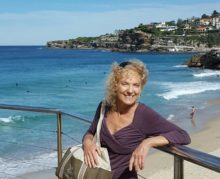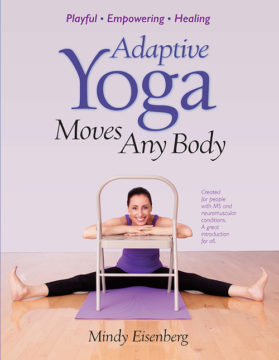 What a gift it is to meet yoga practitioners from diverse backgrounds, cultures and countries! I was recently teaching in Australia and fell in love—with the people, the beaches, the cities, the wildlife and the practice of yoga, all over again. Thank you to the many kind yogins who hosted me and whom I met! You know who you are.
What a gift it is to meet yoga practitioners from diverse backgrounds, cultures and countries! I was recently teaching in Australia and fell in love—with the people, the beaches, the cities, the wildlife and the practice of yoga, all over again. Thank you to the many kind yogins who hosted me and whom I met! You know who you are.
In this issue we focus on a new book about adaptive yoga, so important now that people come to yoga for therapeutic reasons—not just for enlightenment! We also talk pleasure in telling you about an important study, recently published in the Journal for Depression and Anxiety, that compares yoga individual yoga sessions (rather than group classes) with treatment as usual for anxiety and depression.
I hope to see you at one of the LifeForce Yoga workshops or trainings this spring!
Review: Adaptive Yoga Moves Any Body, by Mindy Eisenberg, MHSA, E-RYT-500
 I wish I could take an adaptive yoga class from Mindy Eisenberg, but since she lives in southeastern Michigan and I live in north Texas, I can’t make it to her classes. However, I have the next best thing, a copy of her new book: Adaptive Yoga Moves Any Body, which was created for people with multiple sclerosis (MS) and neuromuscular conditions.
I wish I could take an adaptive yoga class from Mindy Eisenberg, but since she lives in southeastern Michigan and I live in north Texas, I can’t make it to her classes. However, I have the next best thing, a copy of her new book: Adaptive Yoga Moves Any Body, which was created for people with multiple sclerosis (MS) and neuromuscular conditions.
Eisenberg’s heartening voice resonates from the first words on the acknowledgements page of this book – a hefty volume that artfully weaves description and demonstration with encouragement and empathy.
Her journey toward adaptive yoga began when Eisenberg was a young girl, watching her mother live with a progressive form of multiple sclerosis that confined her to a wheelchair for more than 25 years. After completing her first teacher training in 2004, Eisenberg volunteered at the Michigan Institute for Neurological Disorders, a prominent neurological center in her area, as a yoga instructor for students with MS. Today she provides small group adaptive yoga therapy classes for over 70 students with MS per week, and her book – five years in the making – blossomed from that.
“Why did I write this book?” she asks. “Very simply, my Yoga Moves students asked me to write a guide for them. They needed a way to remember the poses and techniques and asked me for a few photos with accompanying instructions.”
This book more than delivers. It contains more than 500 clear, helpful photos of Eisenberg and her students practicing 71 traditional yoga poses (from physically challenging to deeply restorative) with many adaptations. The book is systematically laid out, beginning with an introduction to the philosophy of adaptive yoga practice, then progressing to the fundamentals of breath practice and alignment, proper warm-up, adaptive poses and the use of mudras.
The final chapter of Adaptive Yoga Moves Any Body weaves everything together with an assortment of sequences. One of my favorites is, “In the Kitchen Sequence Waiting for the Rice to Cook,” which ends with the final step: “Enjoy the yummy rice!” Eisenberg’s sense of humor and playfulness are laced throughout this richly researched and well-organized book. Her philosophy is summed up by her words, “The most important yoga pose is your smile, and the most important words in your practice are, ‘Yes, I can!’”
Compassionate self-awareness, the hallmark of LifeForce Yoga®, is fundamental to Eisenberg’s work. “Help defray any anger or resentment you might feel that your body has betrayed you by referring to your body parts as ‘co-workers,’” she writes. “The intricate parts are working together, doing the best they can. You are nurturing yourself through your practice, not competing against your body’s limitations. The advanced yogi is not the one who can put their foot behind their head,” she concludes. “It is the one who knows when to take a break.”
(Four videos that complement the book will be posted on Eisenberg’s website, www.yogamovesms.org, in June 2016. Additional videos will be posted throughout the year.)
Dana Mildebrath, LFYP-2, RYT-200, and Certified Laughter Yoga Leader has been teaching gentle and adaptive yoga since 2008. As the survivor of a rare neuromuscular disorder called Guillain-Barre Syndrome, she says, “Adaptive yoga is the name of the game for me!”
Order a copy of Adaptive Yoga Moves Any Body
Research: Validation for Individualized Yoga as Adjunct Treatment for Depression & Anxiety
 This randomized controlled trial published in the prestigious Journal of Depression and Anxiety marks a significant contribution to the literature on the benefits of yoga practice on depression, anxiety and improving well-being. What is important here is that Michael de Manincor and his colleagues in New South Wales, Australia, chose to offer four individualized private yoga sessions over a six week period to help study participants design a home practice with which they felt comfortable. Most prior research on yoga practice has measured outcomes of those who participate in group classes with a control group who do something else, like meet to discuss good mental health practices, or are assigned special readings, or are wait-listed for the primary intervention. The control group in this study was wait-listed, and then received the intervention, after the measurements on the first group were complete. With just four sessions of yoga with a qualified teacher trained in viniyoga, home practice compliance was high. Of the 53 participants who received the intervention, only 5 dropped out, which is the same number who left the 54 member control group.
This randomized controlled trial published in the prestigious Journal of Depression and Anxiety marks a significant contribution to the literature on the benefits of yoga practice on depression, anxiety and improving well-being. What is important here is that Michael de Manincor and his colleagues in New South Wales, Australia, chose to offer four individualized private yoga sessions over a six week period to help study participants design a home practice with which they felt comfortable. Most prior research on yoga practice has measured outcomes of those who participate in group classes with a control group who do something else, like meet to discuss good mental health practices, or are assigned special readings, or are wait-listed for the primary intervention. The control group in this study was wait-listed, and then received the intervention, after the measurements on the first group were complete. With just four sessions of yoga with a qualified teacher trained in viniyoga, home practice compliance was high. Of the 53 participants who received the intervention, only 5 dropped out, which is the same number who left the 54 member control group.
The yoga instruction was tailored to each participant’s physical and emotional needs and based on the principles of viniyoga. According to de Manincor, the study’s principal author, “Teachers were from a variety of different backgrounds in yoga.” They taught their students in accordance with the principle of viniyoga, which de Manincor describes as “a universal principle for all yoga – teaching or adapting according to the needs, abilities, goals and circumstances of each individual or group.” Participants averaged 4.8 days of practice per week with an average of 29 minutes per session. During the six-week follow-up period after the first six weeks of individualized instruction and home practice was complete, participants continued their home practices. The published study explains the components of yoga practice in more detail. However it is fair to say that the main focus of the protocol for most individuals included repeated breath-focused gentle yet dynamic movements in postures rather than long holding of poses. The yoga protocol for many people also included relaxation, relaxed abdominal breathing, a lengthened exhalation, more forward bends then backbends, meditation with a particular focus like sound repetition, rather that emptiness and the formulation of a personal intention. The participants were recruited from five cities and were representative of varying geographic and socioeconomic backgrounds. What they had in common was a score of at least mild, moderate or severe depression or anxiety and their medication and mental health treatment was unchanged for three months. Both the yoga group and the control group continued their mental health treatment as usual.
Participants were measured for depression, anxiety and general well-being at the commencement of the study (baseline), at the conclusion of the intervention, and at a six week follow-up. When the yoga group’s scores were compared to the wait list group, There were statistically significant improvements in depression scores in the yoga group as compared to controls. The yoga group had general improvements in mental health and resilience scores, as compared to controls, and all improvements held at the six week follow-up.
As yoga is applied therapeutically and often individually, it is vital to have this kind of important validation for individually applied treatment.
Free Practice: Sunrise Practice at Coogee Beach in New South Wales, Australia
A free video practice with Amy Weintraub during her recent visit to Australia where she led the first LifeForce Yoga Practitioner Training – Module A in Australia, and also attended the Australian Yoga Therapy Conference.
News: Professional (CEC) and Personal Development with LifeForce Yoga
We are very excited to announce the following CEU credit for our July programs:
July 1-3, 2016, LifeForce Yoga for Depression and Anxiety: I Am Bliss and So Are You
This two day program is open to all and has been awarded 12 hours of nursing credits, 11.5 hours of social work credits, and 12 Yoga Alliance contact hour credits.
July 3-8, 2016, Yoga for Mood Management: LifeForce Yoga Practitioner Training-Module A
This five-day program is open to all and has been awarded 33 hours of social work credits, 33 Yoga Alliance contact hour credits, 33.5 hours of nursing continuing education credits, and 15 hours of psychology CE credits.
July 25-29, 2016, LifeForce Yoga Skills for Therapists
This five-day program is for mental and health care professionals. No prior yoga experience or yoga mat necessary. CEC’s awarded – learn more!
Please let me know when you will be back in Virginia and offering any of these workshops.
Hi, Ann! Thank you for your interest. Please take a look at the events calendar on the website. I’ll be leading a weekend at Yogaville in October, a training in the spring.
Do you ever do workshops in no Cali. San Francisco, Berkeley etc??
Hi Jeanne,
Thank you for your email. We do not have anything scheduled in Northern California through the end of the year. We used to go to Mt. Madonna and really love teaching there. The closest scheduled training this year would be Encinitas, CA.
Love the video with you chanting the Gayatri, Amy. Peaceful.
Hi Amy , We Met Several Years ago When You Were @ Yogaview In Wilmette , Il .i loved Your Program . . I purchased A CD , which I loved Doing Often .. I lent To Someone … I don’t remember Who ?? Ha Ha ..
Working With My Treatable Breast Cancer .. During my Treatments . Your program Is So soothing ..
I would like To Buy That CD & others if you Have Them . Thank You Darlung Amy ?? Donna Berger
Hello, Donna,
Blessings and ease to you as you move through treatment. Here’s the link to CDs and DVDs. http://yogafordepression.com/section/audio/ and http://yogafordepression.com/section/video/ Please scroll down, because I notice there are a number of short practices at the top.